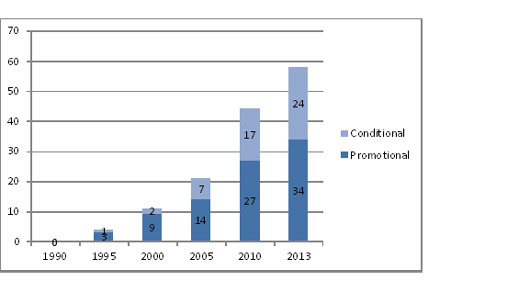More and better jobs
Labour standards increasingly included in bilateral and regional free trade agreements
A new ILO report shows free trade agreements with measures relating to labour standards are on the rise and recommends measures to improve their effectiveness.
GENEVA (ILO News) – The number of trade agreements that include labour provisions has increased significantly over the past two decades, according to a new report by the International Labour Organization (ILO).
The report on the Social Dimensions of Free Trade Agreements says that there has been a substantial growth in the number of trade agreements featuring labour-related measures since the mid-1990s, including more ‘South-South agreements’ between developing countries.
In total, there were 58 agreements with labour provisions in June 2013 – almost a quarter of the total 248 trade agreements currently in force. These have included provisions on minimum working conditions, enforcement of national labour laws, as well as monitoring and enforcing labour standards.
“The increasing number of trade agreements which include provisions with respect to labour standards is a reflection of the growing awareness that trade liberalization, important as it is, should go hand-in-hand with progress on the employment and social front,” said Raymond Torres, Director, in charge of the ILO Research Department.
In some cases, the improvement of labour standards has been made a condition for the entry-into-force of agreements between countries. In the last six of seven US trade agreements, some improvements in labour standards were made prior to their coming into force.
In almost 60 per cent of cases, the agreements promote compliance with labour standards, without direct commercial or financial consequences attached to them. This often involves cooperation between partner countries to improve working conditions and commitments to maintain labour standards.
The report says that none of the agreements studied show signs of protectionism by the governments concerned. In all cases where issues were raised regarding the alleged non-compliance with a given labour provision, a significant effort was made to resolve the issue without resorting to sanctions. Indeed, no dispute regarding labour provisions has given rise to sanctions so far.
The sheer variety of labour clauses with different legal and institutional implications makes it difficult to generalize about their effects.
According to the report, when conditions are applied at the pre-ratification stage, they sometimes lead to significant changes in labour legislation, such as improvements in labour inspection or the adoption of new legal protections, especially in the area of freedom of association.
When they are introduced after the deal has been signed, complaint mechanisms sometimes helped to ensure compliance with existing labour laws. In addition, there has often been a wide range of cooperative activities among signatory parties after ratification. For example the MERCOSUR* Regional Plan on Labour Inspection has triggered joint inspection activities, often facilitating improvements in national practice.
The report suggests several avenues for improving the effectiveness of labour provisions in trade agreements, including:
Increase in number of labour provisions in bilateral and regional trade agreements,
1990-2013
* An economic and political agreement among several South American countries including Argentina, Brazil Paraguay and Uruguay.
The report on the Social Dimensions of Free Trade Agreements says that there has been a substantial growth in the number of trade agreements featuring labour-related measures since the mid-1990s, including more ‘South-South agreements’ between developing countries.
In total, there were 58 agreements with labour provisions in June 2013 – almost a quarter of the total 248 trade agreements currently in force. These have included provisions on minimum working conditions, enforcement of national labour laws, as well as monitoring and enforcing labour standards.
“The increasing number of trade agreements which include provisions with respect to labour standards is a reflection of the growing awareness that trade liberalization, important as it is, should go hand-in-hand with progress on the employment and social front,” said Raymond Torres, Director, in charge of the ILO Research Department.
In some cases, the improvement of labour standards has been made a condition for the entry-into-force of agreements between countries. In the last six of seven US trade agreements, some improvements in labour standards were made prior to their coming into force.
In almost 60 per cent of cases, the agreements promote compliance with labour standards, without direct commercial or financial consequences attached to them. This often involves cooperation between partner countries to improve working conditions and commitments to maintain labour standards.
The report says that none of the agreements studied show signs of protectionism by the governments concerned. In all cases where issues were raised regarding the alleged non-compliance with a given labour provision, a significant effort was made to resolve the issue without resorting to sanctions. Indeed, no dispute regarding labour provisions has given rise to sanctions so far.
Effectiveness of labour provisions
The sheer variety of labour clauses with different legal and institutional implications makes it difficult to generalize about their effects.
According to the report, when conditions are applied at the pre-ratification stage, they sometimes lead to significant changes in labour legislation, such as improvements in labour inspection or the adoption of new legal protections, especially in the area of freedom of association.
When they are introduced after the deal has been signed, complaint mechanisms sometimes helped to ensure compliance with existing labour laws. In addition, there has often been a wide range of cooperative activities among signatory parties after ratification. For example the MERCOSUR* Regional Plan on Labour Inspection has triggered joint inspection activities, often facilitating improvements in national practice.
The report suggests several avenues for improving the effectiveness of labour provisions in trade agreements, including:
- Specific labour-related development objectives to be delivered in a set time-frame, linked to economic incentives.
- Increased synergies between the labour provisions of different bilateral trade agreements.
- Greater consultation of employer and worker organizations in the negotiation and implementation of labour provisions.
- Improved coherence between labour provisions in trade agreements and relevant ILO instruments.
Increase in number of labour provisions in bilateral and regional trade agreements,
1990-2013
 |